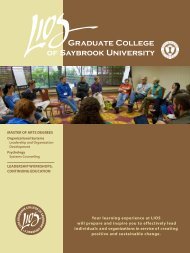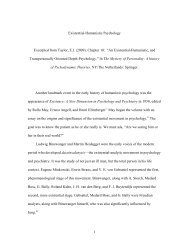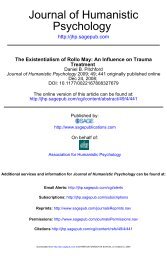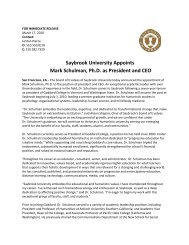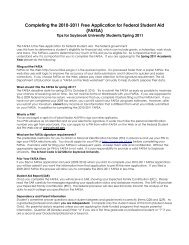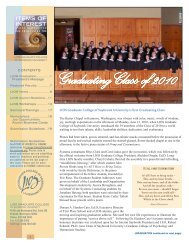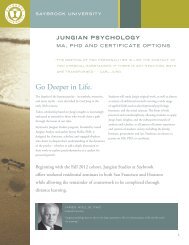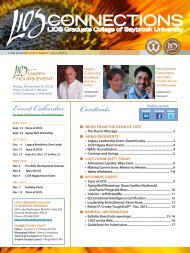Appendix F - Saybrook University
Appendix F - Saybrook University
Appendix F - Saybrook University
Create successful ePaper yourself
Turn your PDF publications into a flip-book with our unique Google optimized e-Paper software.
Code of Conduct, which includes ethical guidelines relating to<br />
all areas of psychological practice. The primary focus of the<br />
course will include the introduction and study of Jungian ideas<br />
interfacing with what Jung named to be the new ethic, an ethic<br />
that offers the individual a pathway for discovering and identifying<br />
one's ethical conscience, an aspect of oneself necessary for<br />
recognizing, examining, and responding to ethical questions and<br />
concerns alongside the already existing professional standards.<br />
Students will investigate and familiarize themselves with state<br />
laws, national association, organization and board policies and<br />
standards relevant to the practice of psychology in conjunction<br />
with the Jungian perspective. As a result, the students' perspective<br />
on ethics will expand and deepen the ability of the student<br />
to more consciously apply ethical considerations in their personal<br />
and professional lives as teachers, clinicians, researchers, and<br />
others working in the multi-faceted fields of psychology.<br />
Prerequisite: Enrollment in a Psychology–Jungian Studies<br />
Specialization certificate, MA, or doctoral program or by permission.<br />
3.0 credits.<br />
PSY 6060<br />
PSY 7510<br />
PSYD 8010<br />
Ethics in Psychotherapy and Psychological Research<br />
Students are asked to critically evaluate APA Ethical Principles<br />
and state laws governing psychologists, and to examine the ethical<br />
implications of their personal beliefs and values for their<br />
work. This course focuses on the ethical issues that arise in the<br />
practice of psychotherapy and in designing and carrying out psychological<br />
research. 3.0 credits.<br />
Social Psychology<br />
Social Psychology is fundamental to the study of psychology and<br />
the human sciences. In this course, major theories, methods and<br />
research findings that comprise the discipline of social psychology<br />
are examined from a critical standpoint. The primary objective<br />
of this course is to increase students awareness of the social,<br />
historical and political dimension to psychological understanding.<br />
The application of theoretical and empirical work to realworld<br />
social problems is emphasized. 3.0 credits.<br />
Intervention I: Humanistic-Existential Psychotherapy<br />
This course focuses on advanced study of integrative humanistic<br />
psychotherapeutic practice. The emphasis is on what therapists<br />
actually do more so than on theory. Effective practice is studied<br />
274



